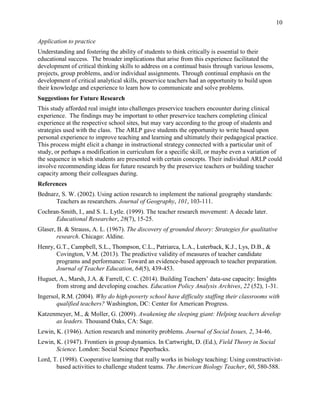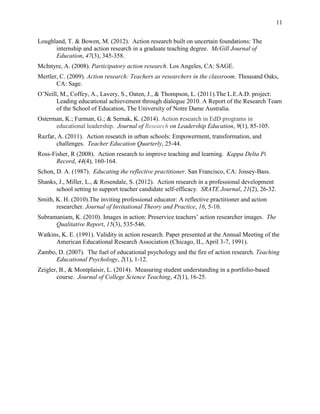This document discusses the use of action research by alternative master’s preservice teachers during a 16-week clinical experience at a historically black college and university. The study highlights how preservice teachers reflect on their teaching practices and improve their competencies by analyzing data collected from their classroom experiences. The findings emphasize the importance of collaboration and reflection for enhancing teacher capacity and addressing challenges faced in educational settings.
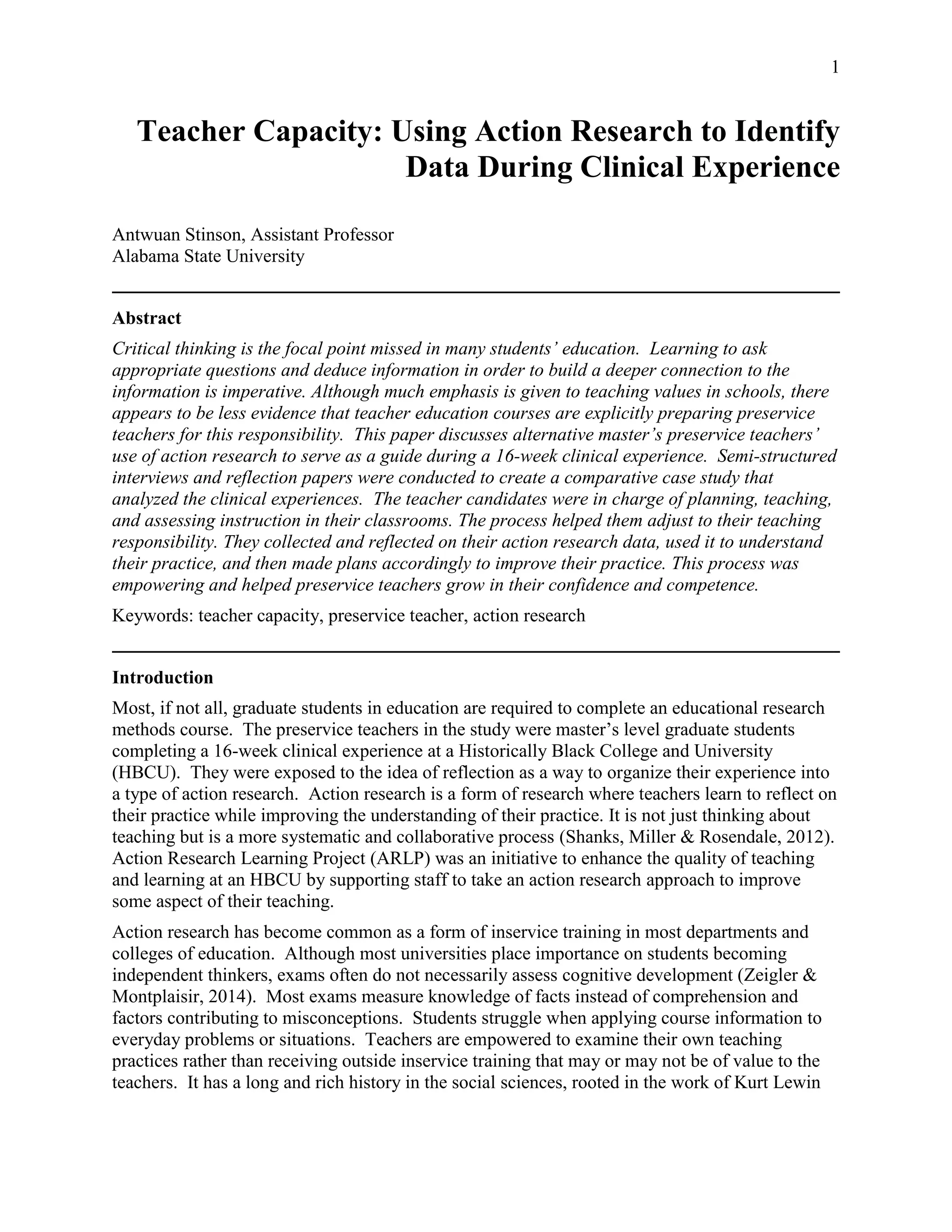
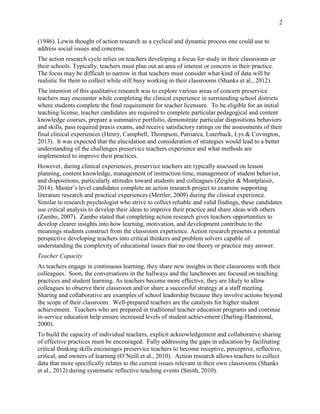
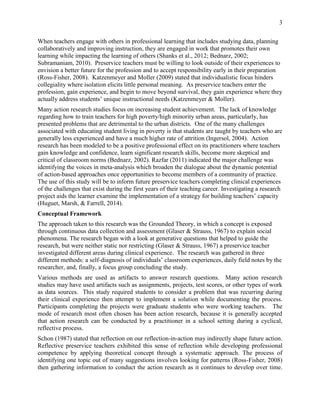
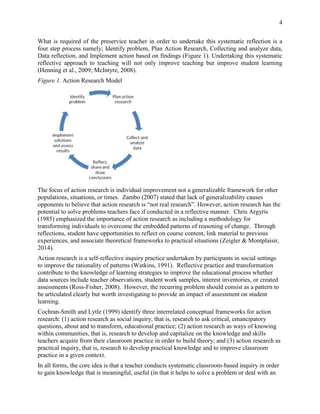
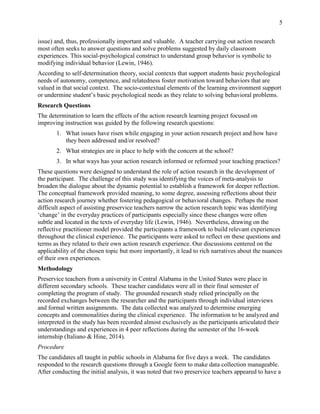
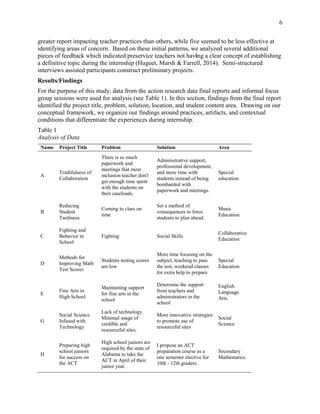
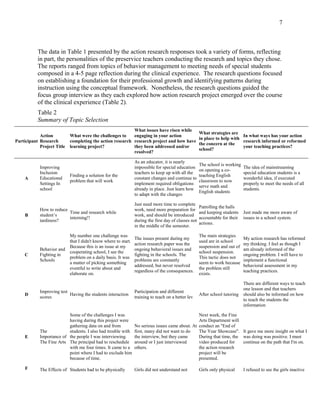
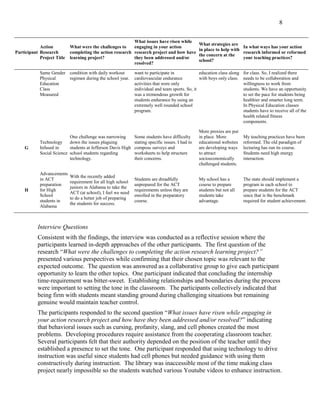
![9
Participants responded to the third question “What strategies are in place to help with the
concern at the school?” indicating the support systems were not there. The participants
indicated that most teachers must be creative with activities during instruction, particularly, when
assuming the role of the teacher. Adolescent students may actually turn to school as a way to
define themselves resulting in a higher sense of belonging. Student who require special
education services need confirmation and knowledge about teacher expectations. Preservice
teachers indicated that communicating expectation early really helped when administrative
support was unavailable to deal with students who displayed behavioral issues. The behavioral
challenges included students with attention difficulties, major self-esteem issues, belligerence,
defiance and those that didn’t listen. One participant indicated that several special needs students
wanted to perform extremely well on assessments that they would cry because they did not know
how to read. It was stated that “nothing was in place [allowing teachers] to be creative” during
the day.
Participants responded to the fourth and last question “In what ways has your action research
informed or reformed your teaching practices?” Topics revolved primarily around on pedagogy
and content-specific curriculum, increasing problem solving related to data, and improving the
use of data for monitoring and planning student growth. However, the topics were improving
techniques integrating technology during instruction, student achievement, inclusion settings,
school curriculum, and behavioral management. The special education preservice teacher
(Participant A) indicated that it was important to approach students softly, avoiding “fussing”
while the other (Participant D) stated the importance of being firm to establish boundaries.
Participant G emphasized the importance to differentiating instruction using performance-based
activities which engaged difficult learners who presented with behavioral issues.
Discussion
Participants had difficulty completing action research in the areas of identifying a specific
problem, approaching a procedure to problem solving, establishing intervention strategies that
addresses the problem, and developing outcomes that are targeted by the research questions. Not
all students follow through with the process. Students may not experience to plan intervention
while teaching. Some had limited experience with identifying the problem of the action research
project.
Explanation of unexpected findings
Action research presents a practical approach to conducting research. From the study, it was
evident that the participants were naïve in their approach to identify and narrow topics that
would result in a solution-oriented project. The ARLP definitely needed to be operationalized to
define the requirement and discuss ways that it could be used to improve their practices and to
affect classroom reform. The preliminary exploration of the use of action research only
uncovered their misunderstanding when identifying, developing and providing a solution to the
problem.
The core idea is for preservice teachers to “conduct systematic classroom-based inquiry in order
to gain knowledge that is meaningful” (Bednarz, 2002) but continuously evolving through
higher-level inquiry throughout their practice (Zeigler & Montplaisir, 2014). Action research is
an ideal pedagogy to achieve critical thinking through their analysis and creation of a narrative
story. The conceptual framework provided a reflective teacher lens which students executed a
degree of flexibility that was relevant to their experiences (Loughland & Bowen, 2012).](https://image.slidesharecdn.com/teachercapacityusingactionresearchtoidentifydataduringclinicalexperiencemain-160704130321/85/Using-Action-Research-to-Identify-Data-During-Clinical-Experience-main-9-320.jpg)
